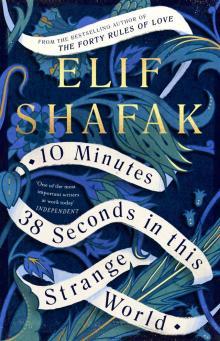- Home
- Elif Shafak
The Forty Rules of Love Page 6
The Forty Rules of Love Read online
Page 6
The shepherd was astonished to hear this, but even deeper was his relief. Nevertheless, he did not want to go back to his old prayers. Neither did he abide by the formal prayers that Moses had taught him. He had now found a new way of communicating with God. Though satisfied and blessed in his naïve devotion, he was now past that stage—beyond his sweet blasphemy.
“So you see, don’t judge the way other people connect to God,” concluded Shams. “To each his own way and his own prayer. God does not take us at our word. He looks deep into our hearts. It is not the ceremonies or rituals that make a difference, but whether our hearts are sufficiently pure or not.”
I checked the judge’s face. I could see beneath his mask of absolute confidence and composure that he was clearly annoyed. Yet at the same time, being the astute man that he was, he had detected a tricky situation. If he reacted to Shams’s story, he would have to take the next step and punish him for his insolence, in which case things would get serious and everybody would hear that a simple dervish had dared to confront the high judge. It was therefore better for him to pretend there was nothing to be upset about and leave it there.
Outside, the sun was setting, painting the sky a dozen shades of crimson, punctuated now and again by dark gray clouds. In a little while, the judge rose to his feet, saying he had some important business to attend to. After giving me a slight nod and Shams of Tabriz a cold stare, he strode off. His men followed wordlessly.
“I am afraid the judge didn’t like you much,” I said when everyone had left.
Shams of Tabriz brushed his hair from his face, smiling. “Oh, that is quite all right. I am used to people not liking me much.”
I couldn’t help feeling excited. I had been the master of this lodge long enough to know that it was not often such a visitor came.
“Tell me, dervish,” I said, “what brings someone like you to Baghdad?”
I was eager to hear his answer but also strangely fearful of it.
Ella
NORTHAMPTON, MAY 20, 2008
Belly dancers and dervishes spun in Ella’s dream on the night her husband didn’t come home. Her head resting on the manuscript, she watched as rough-looking warriors dined at a roadside inn, their plates piled high with delicious pies and desserts.
Then she saw herself. She was searching for someone in a bustling bazaar in a citadel in a foreign country. All around her, people moved slowly, as if dancing to a tune she couldn’t hear. She stopped a fat man with a drooping mustache to ask something, only she couldn’t remember the question. The man looked at her blankly and hobbled away. She tried to talk to several vendors and then shoppers, but no one responded to her. At first she thought it was because she couldn’t speak their language. Then she put her hand to her mouth and realized with horror that her tongue had been cut off. With increasing panic she looked around for a mirror to see her reflection and figure out if she was still the same person, but there was none in the bazaar. She started to cry and woke up to a disturbing sound, not knowing whether she still had a tongue.
When Ella opened her eyes, she found Spirit frantically scratching at the back door. An animal had probably gotten onto the porch, driving the dog crazy. Skunks made him particularly nervous. The memory of his inopportune encounter with one last winter was still fresh. It had taken Ella weeks to remove that nasty odor from the dog, and even after she’d washed him in tubs of tomato juice, the smell lingered, reminiscent of burning rubber.
Ella glanced at the clock on the wall. It was a quarter to three in the morning. David was still not back, and perhaps he never would be. Jeannette had not returned her call, and in her pessimistic state Ella doubted she ever would. Seized by the terror of being abandoned by her husband and daughter, she opened the fridge and looked through it for a few minutes. The desire to scoop out some cherry vanilla ice cream warred with the fear of gaining weight. With no small effort, she took a step away from the fridge and slammed the door, a bit more harshly than necessary.
Then Ella opened a bottle of red wine and poured herself a glass. It was good wine, light and lively, with an underlying hint of bittersweetness that she liked. Only when she was filling the second glass did it occur to her she might have opened one of David’s expensive Bordeaux. She checked the label—Château Margaux 1996. Not knowing what to make of that, she frowned at the bottle.
She was too tired and too sleepy to read anymore. So she decided to check her e-mail. There, among half a dozen junk e-mails and a message from Michelle inquiring about how the manuscript was going, she found an e-mail from Aziz Z. Zahara.
Dear Ella (if I may),
Your e-mail found me in a village in Guatemala called Momostenango. It’s one of the few places left where they still use a Mayan calendar. Right across from my hostel, there is a wish tree bedecked with hundreds of pieces of fabric of every color and pattern you can imagine. They call it The Tree of the Brokenhearted. Those with broken hearts write down their names on pieces of paper and tie these to the branches, praying for their hearts to be healed.
I hope you won’t find this too presumptuous, but after reading your e-mail I went to the wish tree and prayed that you and your daughter solve this misunderstanding. Even a speck of love should not go unappreciated, because, as Rumi said, love is the water of life.
One thing that has helped me personally in the past was to stop interfering with the people around me and getting frustrated when I couldn’t change them. Instead of intrusion or passivity, may I suggest submission?
Some people make the mistake of confusing “submission” with “weakness,” whereas it is anything but. Submission is a form of peaceful acceptance of the terms of the universe, including the things we are currently unable to change or comprehend.
According to the Mayan calendar, today is an auspicious day. A major astrological shift is on its way, ushering in a new human consciousness. I need to hurry to send you this e-mail before the sun sets and the day is over.
May love find you when you least expect, where you least expect.
Yours sincerely,
Aziz
Ella shut off the laptop, moved to learn that a complete stranger in a remote corner of the world had prayed for her well-being. She closed her eyes and imagined her name written on a piece of paper tied to a wish tree, dangling like a kite in the air, free and happy.
A few minutes later, she opened the kitchen door and stepped out into the backyard, enjoying the unsettling coolness of the breeze. Spirit stood beside her, uneasy and growling, constantly sniffing the air. The dog’s eyes grew small, then big and anxious, and his ears kept perking up, as if he had recognized in the distance something scary. Ella and her dog stood side by side under the late-spring moon, staring into the thick, vast darkness, similarly frightened of the things moving in the dark, frightened of the unknown.
The Novice
BAGHDAD, APRIL 1242
Bowing and scraping, I showed the judge to the door and quickly returned to the main room to collect the dirty bowls. I was surprised to find Baba Zaman and the wandering dervish in the same position as when I left them, neither one saying a word. Out of the corner of my eye, I checked them, wondering if it could be possible to carry on a conversation without talking. I lingered there as long as I could, arranging the cushions, tidying up the room, picking up the crumbs on the carpet, but after a while I ran out of reasons to stay.
Halfheartedly, I dragged my feet back to the kitchen. As soon as he saw me, the cook started to rain orders. “Wipe the counter, mop the floor! Wash the dishes! Scrub the stove and the walls around the grill! And when you are done, don’t forget to check the mousetraps!” Ever since I’d come to this lodge some six months ago, the cook had been riding roughshod over me. Every day he made me work like a dog and called this torture part of my spiritual training, as if washing greasy dishes could be spiritual in any way.
A man of few words, the cook had one favorite mantra: “Cleaning is praying, praying is cleaning!”
&nbs
p; “If that were true, all the housewives in Baghdad would have become spiritual masters,” I once dared to say.
He threw a wooden spoon at my head and yelled at the top of his lungs, “Such back talk will get you nowhere, son. If you want to become a dervish, be as mute as that wooden spoon. Rebelliousness is not a good quality in a novice. Speak less, mature quicker!”
I hated the cook, but, more than that, I feared him. I had never disobeyed his orders. That is, until this evening.
As soon as the cook turned his back, I sneaked out of the kitchen and tiptoed to the main room again, dying to learn more about the wandering dervish. Who was he? What was he doing here? He wasn’t like the dervishes in the lodge. His eyes looked fierce and unruly, even when he bowed his head in modesty. There was something so unusual and unpredictable about him that it was almost frightening.
I peeped through a crack in the door. At first I couldn’t see anything. But soon my eyes adjusted to the semidarkness inside the room and I could make out their faces.
I heard the master ask, “Tell me, Shams of Tabriz, what brings someone like you to Baghdad? Have you seen this place in a dream?”
The dervish shook his head. “No, it wasn’t a dream that brought me here. It was a vision. I never have dreams.”
“Everybody has dreams,” Baba Zaman said tenderly. “It’s just that you might not remember them all the time. But that doesn’t mean you don’t dream.”
“But I do not,” the dervish insisted. “It is part of a deal I made with God. You see, when I was a boy, I saw angels and watched the mysteries of the universe unfold before my eyes. When I told this to my parents, they weren’t pleased and told me to stop dreaming. When I confided in my friends, they, too, said I was a hopeless dreamer. I tried talking to my teachers, but their response was no different. Finally I understood that whenever people heard something unusual, they called it a dream. I began to dislike the word and all that it represented.”
Upon saying this, the dervish paused as if he had heard a sudden sound. Then the strangest thing happened. He stood up, straightened his spine, and slowly, deliberately began to walk toward the door, all the while looking in my direction. It was as if he somehow knew I was spying on them.
It was as if he could see through the wooden door.
My heart pounded like mad. I wanted to run back to the kitchen but couldn’t see how. My arms, my legs, my whole body froze. Through and beyond the door, the dark eyes of Shams of Tabriz were fixed upon me. As terrified as I was, I also felt a tremendous amount of energy rushing through my body. He approached, put his hand on the door handle, but just when I thought he was about to open the door and catch me, he stopped. I couldn’t see his face from this close and had no idea what had changed his mind. We waited like that for an unbearably long minute. Then he turned his back, and as he paced away from the door, he continued with his story.
“When I got a little older, I asked God to take away my ability to dream, so that every time I encountered Him, I would know I wasn’t dreaming. He agreed. He took them all away. That’s why I never dream.”
Shams of Tabriz now stood by the open windows across the room. Outside, there was a light drizzle, and he watched it pensively before he said, “God took away my ability to dream. But to compensate for that loss, He allowed me to interpret the dreams of others. I am a dream interpreter.”
I expected Baba Zaman not to believe this nonsense and to scold him, as he scolds me all the time.
But instead the master nodded respectfully and said, “You seem to be an unusual person. Tell me, what can I do for you?”
“I don’t know. Actually, I was hoping you could tell me that.”
“What do you mean?” asked the master, sounding puzzled.
“For almost forty years, I have been a wandering dervish. I am skilled in the ways of nature, although the ways of society are still alien to me. If necessary, I can fight like a wild animal, but I myself cannot hurt anyone. I can name the constellations in the sky, identify the trees in the forests, and read like an open book the types of people the Almighty has created in His image.”
Shams paused briefly and waited as the master lit an oil lamp. Then he continued. “One of the rules says, You can study God through everything and everyone in the universe, because God is not confined in a mosque, synagogue, or church. But if you are still in need of knowing where exactly His abode is, there is only one place to look for Him: in the heart of a true lover. There is no one who has lived after seeing Him, just like there is no one who has died after seeing Him. Whoever finds Him will remain with Him forever.”
In that dim, flickering light, Shams of Tabriz seemed even taller, his hair falling to his shoulders in disorderly waves.
“But knowledge is like brackish water at the bottom of an old vase unless it flows somewhere. For years I prayed to God for a companion to share the knowledge accumulated inside me. Finally, in a vision in Samarkand, I’ve been told I should come to Baghdad to fulfill my destiny. I understand that you know the name of my companion and his whereabouts and will tell me, if not now, then later.”
Outside, the night had settled, and a wedge of moonlight streamed in through the open windows. I realized how late it was. The cook must have been looking for me. But I didn’t care. For once it felt good to break the rules.
“I don’t know what kind of answer you are asking of me,” murmured the master. “But if there is a piece of information I am destined to reveal, I know it will happen in due time. Until then you can stay here with us. Be our guest.”
Upon hearing this, the wandering dervish bowed humbly and gratefully to kiss Baba Zaman’s hand. That is when the master asked that bizarre question: “You say you are ready to deliver all your knowledge to another person. You want to hold the Truth in your palm as if it were a precious pearl and offer it to someone special. But opening up someone’s heart to spiritual light is no small task for a human being. You’re stealing God’s thunder. What are you willing to pay in return?”
For as long as I live, I will never forget the answer the dervish gave then. Raising an eyebrow, he said firmly, “I am willing to give my head.”
I flinched, feeling a cold shiver travel down my spine. When I put my eye to the crack again, I noticed that the master looked shaken by the answer as well.
“Perhaps we have done enough talking for today.” Baba Zaman exhaled a sigh. “You must be tired. Let me call the young novice. He will show you to your bed and provide clean sheets and a glass of milk.”
Now Shams of Tabriz turned toward the door, and I felt down to my bones that he was gazing at me again. More than that. It was as if he were looking through and into me, studying the pits and peaks of my soul, inspecting secrets that were hidden even from me. Perhaps he was involved with black magic or had been trained by Harut and Marut, the two angels of Babylon that the Qur’an warned us against. Or else he possessed supernatural talents that helped him to see through doors and walls. Either way he scared me.
“No need to call the novice,” he said, his voice attaining a higher pitch. “I’ve a feeling he is nearby and has already heard us.”
I let out a gasp so loud it might have woken the dead in their graves. In utter panic I jumped to my feet and scurried into the garden, seeking refuge in the dark. But an unpleasant surprise was awaiting me there.
“So there you are, you little rascal!” yelled the cook as he ran toward me with a broom in his hand. “You are in big trouble, son, big trouble!”
I jumped aside and managed to duck the broom at the last minute.
“Come here or I’ll break your legs!” the cook shouted behind me, puffing.
But I didn’t. Instead I dashed out of the garden as fast as an arrow. While the face of Shams of Tabriz shimmered before my eyes, I ran and ran along the winding trail that connected the lodge to the main road, and even after I had gotten far away, I couldn’t stop running. My heart pounding, my throat dried up, I ran until my knees gave out and I could run
no more.
Ella
NORTHAMPTON, MAY 21, 2008
Braced for a quarrel, David came home early the next morning, only to find Ella asleep in bed with Sweet Blasphemy open on her lap and an empty glass of wine by her side. He took a step toward her to pull her blanket up a little and make sure she was snugly covered, but then he changed his mind.
Ten minutes later, Ella woke up. She wasn’t surprised to hear him in the bathroom taking a shower. Her husband could flirt with other women, and apparently even spend the night with them, but he would rather not take his morning shower anywhere other than his own bathroom. When David finished and walked back through the room, Ella pretended to be asleep, thus saving him from having to explain his absence.
Less than an hour later, both her husband and the kids had left, and Ella was in the kitchen alone. Life seemed to have resumed its regular course. She opened her favorite cookbook, Culinary Artistry Made Plain and Easy, and after considering several options chose a fairly demanding menu that would keep her busy all afternoon:
Clam Chowder with Saffron, Coconut, and Oranges
Pasta Baked with Mushrooms, Fresh Herbs, and Five Cheeses
Rosemary-Infused Veal Spareribs with Vinegar and Roasted Garlic
Lime-Bathed Green Bean and Cauliflower Salad
Then she decided on a dessert: Warm Chocolate Soufflé.
There were many reasons that Ella liked cooking. Creating a delicious meal out of ordinary ingredients was not only gratifying and fulfilling but also strangely sensual. But more than that, she enjoyed cooking because it was something she was really good at. Besides, it quieted her mind. The kitchen was the one place in her life where she could avoid the outside world altogether and stop the flow of time within herself. For some people sex might have the same effect, she imagined, but that always required two, whereas to cook all one needed was time, care, and a bag of groceries.

 Black Milk: On Writing, Motherhood, and the Harem Within
Black Milk: On Writing, Motherhood, and the Harem Within Three Daughters of Eve
Three Daughters of Eve The Architect's Apprentice
The Architect's Apprentice The Gaze
The Gaze The Flea Palace
The Flea Palace 10 Minutes 38 Seconds in this Strange World
10 Minutes 38 Seconds in this Strange World The Forty Rules of Love
The Forty Rules of Love Honor
Honor The Bastard of Istanbul
The Bastard of Istanbul Black Milk
Black Milk The Happiness of Blond People (Penguin Specials)
The Happiness of Blond People (Penguin Specials)